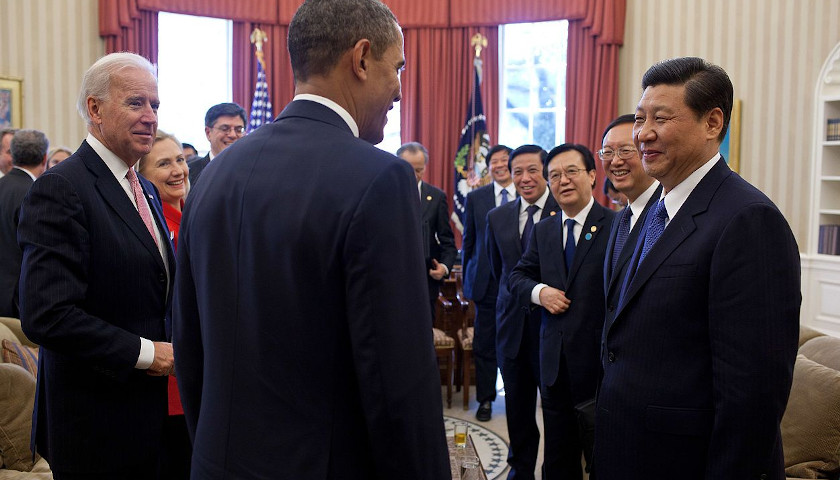A report that examined Chinese acquisitions in the U.S. revealed that the Obama-Biden administration only denied four percent of those that were subject to review by federal regulators.
In stark contrast, the Trump administration denied nearly half of the Chinese proposed acquisitions.
This report comes to light as the 2020 Presidential election is down to the final days and the topic of China remains at the forefront, if nothing else but for China’s role in the spread of COVID-19 and its devastating effects on lives, health and economic standing of people in the U.S. and around the world.
The report, titled CFIUS Scorecard, is the work of Pillsbury Law. The firm’s international trade practice lawyers are recognized leaders in advising both U.S. and non-U.S. clients on the regulation of foreign investment in the U.S., according to the website.
The regulation Pillsbury refers to is primarily CFIUS – the Committee on Foreign Investment in the United States.
CFIUS “is an interagency committee authorized to review certain transactions involving foreign investment in the United States and certain real estate transactions by foreign persons, in order to determine the effect of such transactions on the national security of the United States,” according to the website.
The CFIUS Chair is the Secretary of the Treasury and members include the heads of the Departments of State, Justice, Homeland Security, Commerce, Defense and Energy as well as the Offices of U.S. Trade Representative and Science & Technology Policy.
Additionally, five White House offices observe and, as appropriate, participate in CFIUS activities.
Foreign transactions in the U.S. are broken into categories based on the business sector and include semiconductors, other technology, media, financial, pharma, real estate, energy and other.
Pillsbury’s scorecard of CFIUS reviews narrowly focused on U.S.-China transactions for the period January 2014 to September 2018.
The data was then bifurcated by Pillsbury to reflect the 2014-2016 “Pre-Trump deals” – perhaps more accurately labeled as the Obama-Biden deals – and the “Post-Trump deals” from January 2017 to September 2018.
The data that Pillsbury presents is quite revealing and even alarming for those who are concerned about China’s aspiration for global domination.
During the two-year period under the Obama-Biden administration that Pillsbury reviewed, there were 103 Chinese transactions subject to CFIUS review.
Of those 103, only 4 failed while 99 cleared CFIUS, meaning the Obama-Biden administration approved 96 percent of the Chinese acquisitions in the U.S.
Conversely, during a somewhat shorter review period under the Trump administration, Pillsbury shows that just 51 percent of the Chinese acquisitions were cleared through CFIUS.
What’s more, there were just 41 “Post-Trump” transactions reviewed with only 19 clearing the CFIUS process.
In other words, less than 20 percent of the proposed Chinese acquisitions were approved under the Trump administration versus that of the Obama-Biden administration.
After summarizing the statistics of the China-U.S. transactions, Pillsbury goes on to provide details of the People’s Republic of China buyer, the PRC’s target acquisition, the acquisition target’s market sector, the dollar value of the deal, the CFIUS status as well as a comments section.
Based on Pillsbury’s report of the dollar values of the deals listed, the total value is upwards of $154 billion of proposed Chinese ownership in U.S. While not all of the deals were approved, as previously discussed, the list only includes those that were flagged for CFIUS review.
One name that appears several times on the list of PRC buyers is the financially troubled HNA conglomerate.
According to a report in Forbes, HNA has effectively turned control over to the Hainan provincial government for help in resolving its liquidity crisis by appointing new leaders and organizing a working group to manage its liquidity.
HNA’s portfolio in the U.S. has included the Hilton hotel chain, Red Lion Hotels and Radisson Hospitality, much of which it has shed to pay down debt.
Another frequent appearance on the list is Anbang Insurance, which acquired the iconic Waldorf Astoria in New York and whose former Chairman was sentenced in 2018 to 18 years in jail for fraud and embezzlement, according to the Forbes report.
But one particular transaction on the list jumps out – that of the 2015 Bohai Harvest RST / AVIC acquisition of Michigan-headquartered Henniges Automotive.
The deal is significant for two reasons.
First, the deal was consummated with the help of the Democratic Presidential nominee’s son, Hunter Biden, whose company obtained a 49 percent interest in Henniges.
Second, it has significant national security implications due to Henniges’ anti-vibration technology having possible military applications.
As reported, Bohai Harvest RST (BHR) is a private equity firm funded with $1 billion from the Chinese government via the government-owned Bank of China.
BHR was formed in 2013 through a merger of Chinese-government backed Bohai Capital and U.S. based private equity firm Rosemont Seneca Partners co-owned by Hunter Biden and Chris Heinz, stepson of former U.S. Secretary of State John Kerry as well as Massachusetts-based consulting firm Thornton Group headed by James Bulger, nephew of the famous mob hitman “Whitey.”
The name – Bohai Harvest RST – reflects who was involved with Bohai being a reference to the innermost gulf of the Yellow Sea indicating the Chinese stake in the company; the RS referring to the Hunter Biden/Chris Heinz firm Rosemont Seneca; and the T for Thornton, as Peter Schweizer explains in an excerpt from his book “Secret Empires.”
A controlling 51 percent of Henniges went to China’s AVIC Automotive Systems Holding Co. Ltd.
AVIC reportedly stole technology and aircraft secrets from the Lockheed Martin F-35 Lightning II that was incorporated into China’s J-20 stealth fighter, was added to the “Entity List” by the Bureau of Industry and Security for posing a significant risk to U.S. national security interests and had been sanctioned by the U.S. five separate times for proliferation activities enabling Iran to develop its missile capabilities.
There was enough concern about the potential conflict of interest of Hunter Biden and Chris Heinz as well as U.S. national security issues to prompt Iowa Senator Chuck Grassley, Chairman of the Finance Committee, to author a letter in August 2019 to U.S. Treasury Secretary Steve Mnuchin demanding information about the CFIUS approval process for the deal.
Democratic presidential candidate Joe Biden has said he has never spoken to his son about his overseas business dealings.
Given Henniges touting the 2015 $600 million deal as “one of the largest acquisitions by a Chinese company of a U.S.-based automotive manufacturing company in history,” the review by CFIUS, and the concerns expressed by leading members of the U.S. Senate more than a year ago, the senior Biden’s claims of being unaware are implausible.
—
Laura Baigert is a senior reporter at The Tennessee Star.




